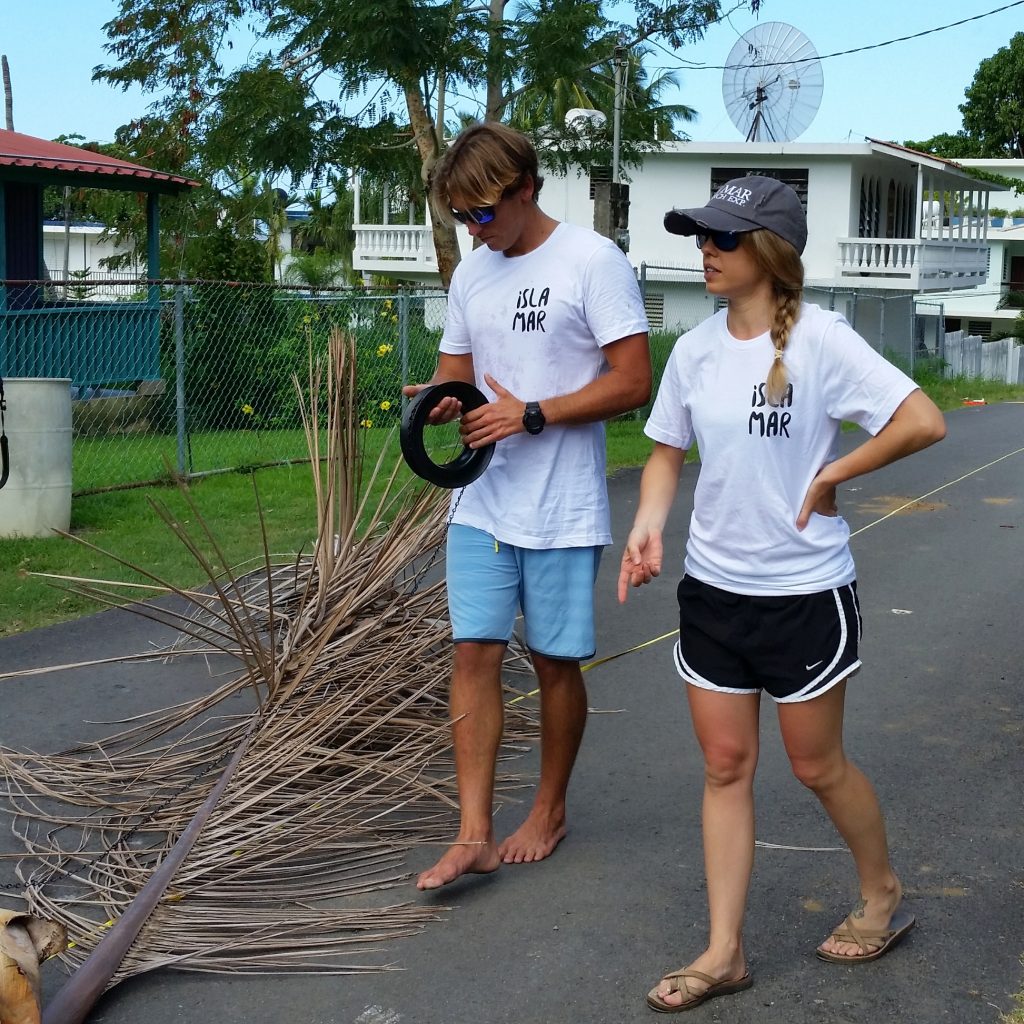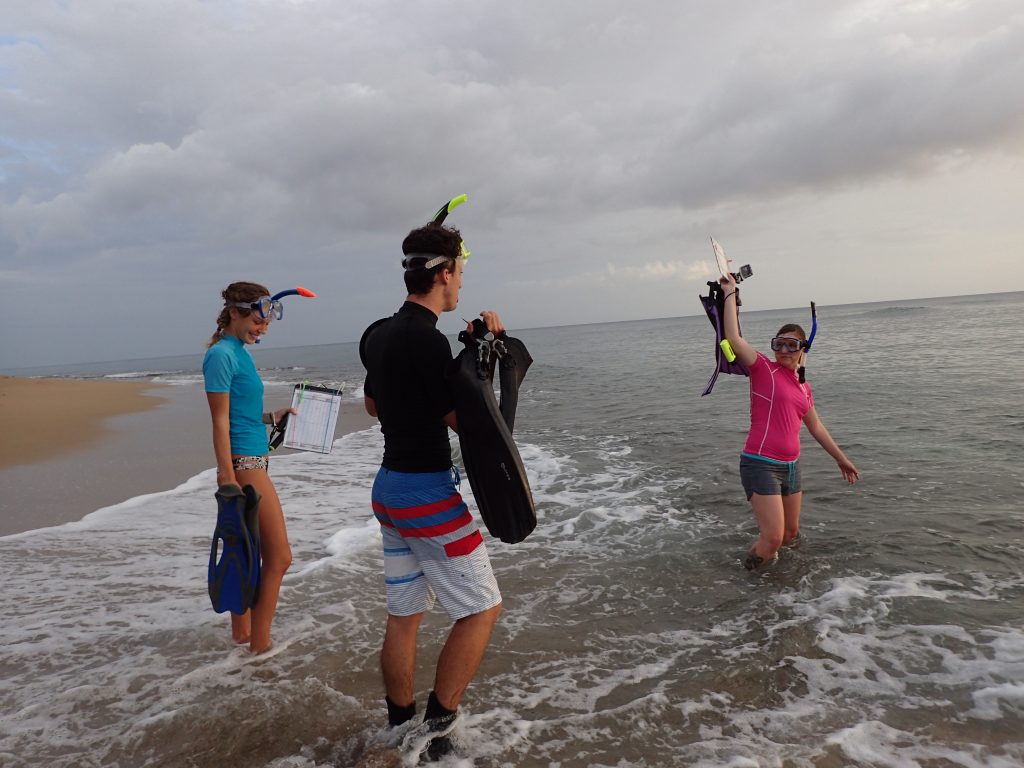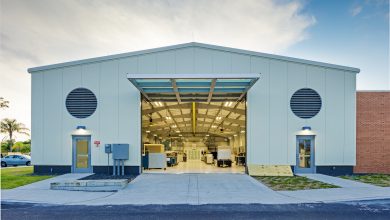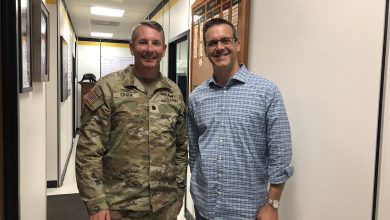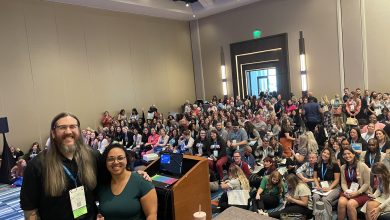Marine Biology Alumni Host Class in the Caribbean
When marine biology alumna Chelsea Harms-Tuohy decided to move to Puerto Rico after graduating from Florida Tech, she didn’t know Florida Tech would follow her.
But every summer she and her husband, fellow FIT alumnus Evan Tuohy, host about a dozen Florida Tech students, who descend on the island for a two-week coral reef ecology field course with their professor, Ralph Turingan, Ph.D., of the Biological Sciences department.
As co-owners of Isla Mar Research Expeditions in Puerto Rico, they organize and lead field courses, train young scientists interested the skills they need to conduct field research in the marine biology system, coordinate internships and lead local outreach and research.
The couple both graduated from Florida Tech’s marine biology program, Evan in 2009, and Chelsea in 2010, earning her master’s in 2011.
“As alum, we are really excited for this on-going partnership that allows us to network with current students and give back to our alma mater that helped shape our careers to what they are today,” Harms-Tuohy said.
 Exploring ecosystems
Exploring ecosystems
During the course, students gain experience in field research methods like underwater visual census and fish identification. They explore the marine environment and learn about the entire coral reef ecosystems, including mangroves and seagrass beds.
“They scuba dive or snorkel and then we also expose them to other unique features of island biogeography like waterfalls, caves, rainforests, dry forests and a night in the old city of San Juan for a truly unique and cultural experience,” Harms-Tuohy said. “We, as Isla Mar, take care of coordinating everything for this course.”
During their stay, students help with local research and monitoring of an important marine reserve in Puerto Rico, the Tres Palmas Marine Reserve in Rincon. They are taught how to conduct surveys to assess fish abundance and diversity, coral reef health and habitat composition and complexity of the reef.
Rave reviews
Sierra Gipson is a psychology student with a concentration in animal behavior who will graduate from Florida Tech with her bachelor’s in May 2018. She was part of the recent field course at Isla Mar and says the experience has motivated her to pursue marine biology.
“Chelsea and Evan were amazing instructors for this course! They showed the beauty of Puerto Rico while also teaching us all an immense amount of useful knowledge for the biology field,” Gipson said. “This incredible experience that was given to us from them has helped me to decide that I want to get back into the Marine Biology department. I hope to follow in their footsteps.”
Pursuing a dream
Another student in this summer’s program, Erin Walters, currently works as an electrical engineer but decided to go back to school to follow her dream of working in marine science.
“Chelsea and Evan at Isla Mar Research Expeditions ran an amazingly well organized two-week course that was jam packed with education filled adventure,” Walters said. “We hiked mountains and learned how vegetation and run-off can affect the ocean. We snorkeled all over Puerto Rico and saw how diverse marine environments can be, even in close proximity to each other. And we learned practical field survey skills and actually put them to use for data collection.”
Walters expects to graduate from Florida Tech with her master’s in ocean engineering in 2018.
“Thanks to Chelsea and Evan, I know a lot more about fish ID, fish behavior, marine habitats, how marine protected areas can affect both fish populations and fishermen in the surrounding communities, and so much more,” Walter said. “I left the course feeling confident about my newly acquired reef survey skills and harboring a growing love for both field work and for Puerto Rico. I wish all my classes could be more like this.”
Exploring the island
As part of the program, there are also plenty of guided hikes and excursions.
“This year, we had a graduate student studying geological oceanography lead a hike along a beach with incredible rock formations to inform students about how the island formed and what sea level was like in the geologic past,” Harms-Tuohy said. “Students experienced the bioluminescent bay in La Parguera, where they could swim around with the dinoflagellates responsible for creating the beautiful glow – this was one of the most memorable experiences for students this year.”
 Always something new
Always something new
Students also had the opportunity to tour a small-scale, organic local coffee farm and network and learn from local scientists who lectured about their on-going research in Puerto Rico.
“Every year has something new, but there is one thing we always keep the same, our goal to give students a very hands-on experience with field research and explore hidden gems of the island of Puerto Rico that they wouldn’t find on a vacation,” Harms-Tuohy said. “We have had the opportunity to network with these students and we are so proud to hear that many of them have gone onto graduate school or found jobs in their field, and that the training they received here made them all the more competitive in the job market.
A haven for marine biology
The couple has coordinated and worked with FIT on this course since 2012, but officially as Isla Mar since 2015.
Last year, Harms-Tuohy earned her Ph.D. from the University of Puerto Rico, Mayaguez and focused on monitoring and managing the lionfish invasion in Puerto Rico.
Aside from her business, she also works as an independent biologist for projects around the Caribbean ranging from habitat vulnerability assessment, the environmental impact of industry on fish assemblages, monitoring spawning aggregations of commercially important fishes and participating in the NOAA National Coral Reef Monitoring Program to assess fish and coral communities on a biannual basis.
“The natural beauty of the island is a huge plus and the people that we work with are amazing,” Harms-Tuohy said. “We have built a great network of colleagues, very supportive scientists and organizations that we work with frequently. It’s hard to beat that.”




